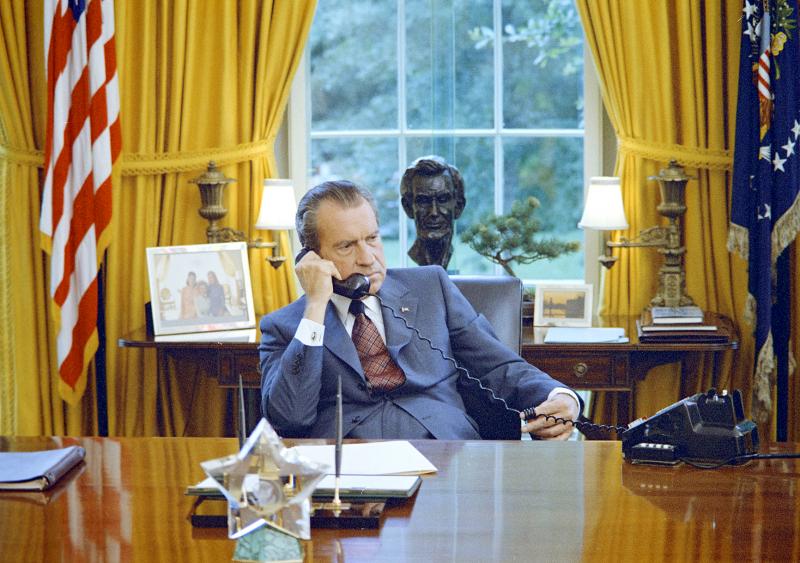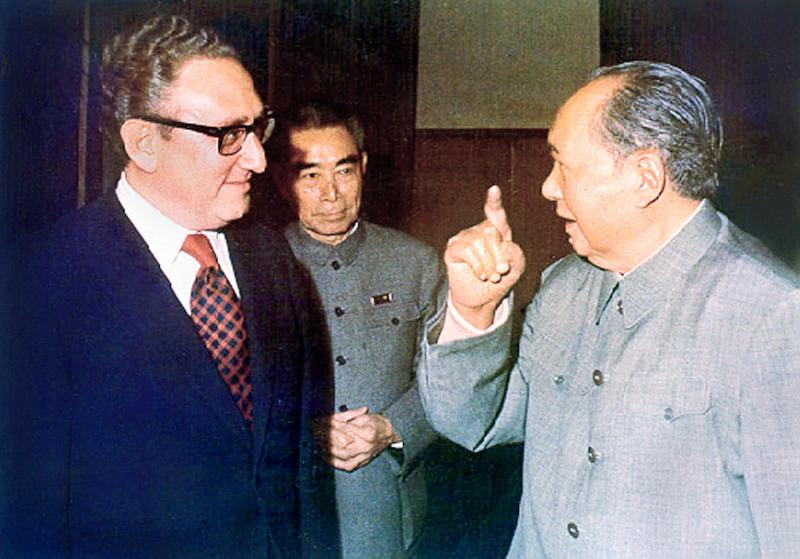US president Richard Nixon had a lot on his mind in the spring of 1971. The Watergate break-in that would ultimately bring down his presidency was more than a year away, but he had a full foreign policy plate with an unpopular war in Vietnam, tensions in the Middle-East and stalled efforts to bring Moscow to the table for talks on limiting nuclear arms.
One other foreign policy challenge, not then publicly known, was the tantalizing prospect of rapprochement with communist China after two decades of estrangement. Nixon and his national security advisor, Henry Kissinger, both believed a breakthrough with “Red China” would increase their leverage in peace talks with the North Vietnamese and arms talks with Moscow.
Something else weighed heavily on Nixon’s mind at that time. Opening up dialog with Beijing might come at the expense of the Republic of China (ROC) on Taiwan. Nixon, who had based his political career on being a staunch opponent of Communism, was a personal friend of the-then 83-year-old Chinese Nationalist Party (KMT) leader Chiang Kai-shek (蔣介石), whom Nixon fondly referred to as “the old man.”

Photo courtesy of Wikimedia Commons
‘WHAT’S BEST FOR US’
In a phone call with Kissinger on the evening of April 14 — the same day TV networks reported on the US ping pong team being invited to China — Nixon expressed his concern over Taiwan’s future.
“The Taiwan thing, that’s sort of worrisome, I don’t know if there’s a damn thing we can do about it, is there?” he asked of Kissinger, who replied: “It’s a tragedy that it had to happen to Chiang at the end of his life, but we have to be cold about it.”

Photo courtesy of Wikimedia Commons
Nixon concurred, adding: “We have to do what’s best for us.”
On July 17, two days after announcing he would make an historic “journey for peace” to Beijing the following year, Taiwan was again on his mind.
“[The president] also brooded some again today, as he does frequently, about the question of how Taiwan can survive now, and that obviously really concerns him,” White House chief of staff H.R. (Bob) Haldeman noted in his diary entry that day.
During his 17 hours of secret meetings with Chinese Premier Chou Enlai (周恩來) in Beijing earlier that month, Kissinger pushed back when Chou tried to link US recognition that Taiwan was “a province of China” as a precondition of Nixon’s visit. However, Kissinger seemed to acquiesce on Chou’s insistence that the visit should set recognition as the “ultimate direction” of US policy.
In his July 14 memo to Nixon on the Chou meeting, Kissinger wrote: “He accepted my position that some time would be required, ie, well into your second term.”
The implication was that, in Nixon’s second term, Taiwan would be abandoned. Haldeman said as much in his July 17 diary entry.
“No promises have been made and no commitments have been made to the Chinese that have to be delivered prior to 1972. But after that, it’s inevitable that Taiwan is going to have to become a province of China or something of that sort. And it does pose a problem especially since the President has been an old China hand from way back — a free China hand, that is,” Haldeman said.
WATERGATE SCANDAL
Although Nixon won the 1972 election in a landslide, the unraveling Watergate scandal would soon consume his presidency and he resigned on Aug. 9, 1974.
In Beijing, communist Chinese leader Mao Zedong (毛澤東) was doing some brooding of his own. Kissinger, who met Mao again on Nov. 12, 1973, noted the chairman’s bafflement at how a “minor incident” like Watergate could cause the “destruction of a strong president.”
“Why is it in your country, you are always so obsessed with that nonsensical Watergate issue? Anyway, we are not happy about it,” Mao said, in slurred speech that was interpreted by his translator.
In the same meeting, Mao admitted Beijing’s relationship with Taiwan was “quite complex,” adding a comment that would have made the US delegation very uncomfortable: He did not believe in a peaceful transition.
“They are a bunch of counter revolutionaries. How could they cooperate with us? I say that we can do without Taiwan for the time being, and let it come after 100 years,” Mao was quoted saying in the official Department of State transcript of the meeting.
Kissinger, who by then was also serving as Nixon’s Secretary of State, replied that the US wanted diplomatic relations with the People’s Republic but that the “current domestic situation” — a probable reference to Watergate, as well as the strong support for Taiwan in Congress — meant that the US could not “immediately sever relations with Taiwan.”
Subsequent high level meetings between US and Chinese leaders would see the same “excuse” given as to why the current administration could not immediately sever relations with Taiwan.
In a meeting with Chinese Vice Premier Deng Xiaoping (鄧小平) on Dec. 4, 1975, Nixon’s successor, president Gerald Ford, said: “We are very grateful that you are understanding of the domestic political situation in the United States.”
When Deng repeated Mao’s earlier assertion that Beijing did not believe in a peaceful transition, and noted Kissinger’s repeated references to Mao’s 100 year time frame, Ford said to laughter: “You can argue that 100 years is a peaceful transition.”
Prior to president Ford’s China visit, Kissinger had met with the Chinese leadership on Oct. 21 that year, accompanied by Ambassador George H. W. Bush and State Department official Winston Lord, who described the meeting as “disturbing,” citing the Chinese perception that the US had become “unreliable” and was a “fading strategic power in the face of Soviet advance.”
Lord’s memo on the meeting, which was handed to president Ford by Kissinger, made the following recommendation on Taiwan: “For now it is better to have the US keep the island under control rather than having it go independent or toward Moscow or Tokyo. The Chinese can wait patiently until the time is ripe, but then they will have to use force ... the US should not ask for peaceful assurances, but it can take its time letting Taiwan go.”
It would be Jan. 1, 1979 before the US would eventually cut diplomatic ties with Taiwan in favor of Beijing, a unilateral move taken by then-president Jimmy Carter, but he too could not ignore the Taiwan-friendly US Congress, which passed the Taiwan Relations Act that ensured the US would provide Taipei with defensive weapons, a move that infuriated Beijing.
Carter only served one term and his successor, Ronald Reagan, was a staunch supporter of Taiwan. During the 1980 election campaign Reagan even threatened to reverse Carter’s decision to cut ties with Taipei, but once in the White House Reagan stuck to the “one China” policy.
In the intervening decades, Taiwan was able to build what has become known as its “silicon shield” — the state-of-the-art semiconductor industry that supplies more than half of the world’s advanced chips — essentially protecting it from the threat of a Chinese military attack.
But the break-in at Washington’s Watergate hotel on June 17, 1972 may well have saved Taiwan from being handed over to China by Kissinger and Nixon.
Craig Addison is writer/producer of Nixon’s China Choice, a podcast docudrama (nixonschinachoice.podbean.com) that tells the behind-the-scenes story of Richard Nixon and Henry Kissinger’s secret diplomacy with China in 1971, and how Taiwan was a pawn in the big game.

The primaries for this year’s nine-in-one local elections in November began early in this election cycle, starting last autumn. The local press has been full of tales of intrigue, betrayal, infighting and drama going back to the summer of 2024. This is not widely covered in the English-language press, and the nine-in-one elections are not well understood. The nine-in-one elections refer to the nine levels of local governments that go to the ballot, from the neighborhood and village borough chief level on up to the city mayor and county commissioner level. The main focus is on the 22 special municipality

The People’s Republic of China (PRC) invaded Vietnam in 1979, following a year of increasingly tense relations between the two states. Beijing viewed Vietnam’s close relations with Soviet Russia as a threat. One of the pretexts it used was the alleged mistreatment of the ethnic Chinese in Vietnam. Tension between the ethnic Chinese and governments in Vietnam had been ongoing for decades. The French used to play off the Vietnamese against the Chinese as a divide-and-rule strategy. The Saigon government in 1956 compelled all Vietnam-born Chinese to adopt Vietnamese citizenship. It also banned them from 11 trades they had previously

Jan. 12 to Jan. 18 At the start of an Indigenous heritage tour of Beitou District (北投) in Taipei, I was handed a sheet of paper titled Ritual Song for the Various Peoples of Tamsui (淡水各社祭祀歌). The lyrics were in Chinese with no literal meaning, accompanied by romanized pronunciation that sounded closer to Hoklo (commonly known as Taiwanese) than any Indigenous language. The translation explained that the song offered food and drink to one’s ancestors and wished for a bountiful harvest and deer hunting season. The program moved through sites related to the Ketagalan, a collective term for the

As devices from toys to cars get smarter, gadget makers are grappling with a shortage of memory needed for them to work. Dwindling supplies and soaring costs of Dynamic Random Access Memory (DRAM) that provides space for computers, smartphones and game consoles to run applications or multitask was a hot topic behind the scenes at the annual gadget extravaganza in Las Vegas. Once cheap and plentiful, DRAM — along with memory chips to simply store data — are in short supply because of the demand spikes from AI in everything from data centers to wearable devices. Samsung Electronics last week put out word